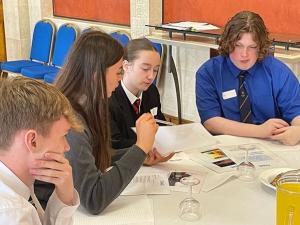
A specially commissioned article written for CRC by Joshua Hillis of Parallel Histories.
“It is so important our young people face up to controversial issues and conflicting narratives. They will be the leaders of the future, so it is important they have the chance to put forward their opinions and to consider the opinions of others in a safe and encouraging environment,” a head of history in a secondary school in Derry/Londonderry.
80 young people gathered at Stormont on 22 September 2023 to do just this. During the day, they debated the perspectives of their community and the perspectives of other communities on the legacy of the Good Friday Agreement. They worked in groups with young people from a different community to their community. They addressed the legacy of the past. They put forward their opinions. They considered the opinions of others. They were building social cohesion.
Parallel Histories organised this conference at Stormont. Parallel Histories is an educational charity which seeks to change the way history is taught and studied to build social cohesion. It seeks to achieve this through enabling schools and young people to address the historical topics which undermine social cohesion today. It presents the topics through the competing narratives of different communities, encourages young people to critically evaluate the evidence, and facilitates debate between young people.
One young person reflected afterwards: “I think today was really, really important in showing that while there are two opposite sides, there’s nuance within those sides. Not everyone is completely and utterly all for one thing or all for another thing.”
The young people came from across Northern Ireland: Ballycastle High School; Cross and Passion College; Campbell College; Belfast Royal Academy; St Genevieve’s High School (Belfast); Glastry College (Ards Peninsula); St Brigid’s College (Derry); St Louis Grammar School (Ballymena); and Belfast Boys’ Model School took part in the project. In the first phase of the project, Parallel Histories provided a series of preparation workshops with the young people in their schools. These workshops prepared the young people for the conference at Stormont through building their critical evaluation skills and understanding of the legacy of the Good Friday Agreement.
For one young person from Belfast, the preparation workshops and the Stormont conference “really showed me how to constructively debate with my peers. It’s far too easy to get caught in a back and forth, tit-for-tat debates where you’re just one upping each other. Whereas today [the Stormont conference] it was more respectful and it was constructive. I really benefitted from it.”
At the conference, the Long Gallery resounded with the young people debating the legacy of the Good Friday Agreement. The young people critically examined the sources underpinning different perspectives. The young people also had the opportunity to visit the Assembly Chamber. Robbie Butler, MLA, hosted the conference as part of Good Relations Week 2023.
One teacher said: “My pupils have benefitted greatly from being involved in debates with other schools. This has massively improved their self-confidence and given them experience with public speaking. Pupils have learnt to try to put their bias to one side and look at both point of views. It has mentored and encouraged my pupils to become more critical thinkers and to become active listeners.”
The Community Relation Council’s Community Relations/Cultural Diversity scheme made this project possible through a grant. This project contributed to priorities of our children and young people and our cultural expression, in The Executive Office’s strategy Together: Building a United Community.
Parallel Histories and the schools continue to work to provide opportunities for young people. The project showed the potential of work bringing together young people to address the legacy of the past.
Further Info
This project was supported by the Community Relations Council through its CR/CD Small Grants Scheme.
Read more about Parallel Histories.